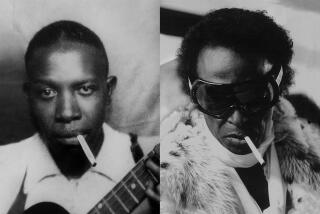57 Groups Appeal L.A. Endowment Rejections : Funding: L.A.’s Cultural Affairs Department will hear appeals from artists and organizations denied funding. But only $55,075 has been set aside for redress.
The Los Angeles Cultural Affairs Department has a seemingly impossible new task: which of the 57 arts groups appealing their initial rejection for L.A. Endowment for the Arts money will get a portion of the relatively small $55,075 set aside on appeal.
Last month, 243 artists and arts organizations were awarded a total of $2,844,925. Now, in the city’s first-ever appeals process, groups and individuals ranging from powerhouses such as the Museum of Contemporary Art to the minuscule California E.A.R. Unit, a contemporary music group, are requesting a second look at their grant applications.
The total requested on appeal is $1.3 million and the Cultural Affairs Department will have to struggle to allocate the limited appeals pot.
“What we set aside may not be enough,” said Adolfo V. Nodal, Cultural Affairs general manager, “but we’ve really done everything we can this year, and I don’t think we’ll be able to find any more money. But if we go through the process and it’s obvious that more people are worthy and there isn’t enough money, then we’ll deal with that at that time and see what tools we might have available.”
Nodal said his staff “arbitrarily picked” the $55,075 figure as a small amount that would leave most of the money for the peer panels to give out, but would “still allow us to fund significantly a limited amount of appeals. We frankly didn’t think . . . we were going to have a lot of viable appeals.”
Nodal said that although he had not yet seen any of the 57 appeals--which included many from organizations with past records of strong city funding--his staff has told him that “about 20% of the appeals appear to have merit. But we will review each of them carefully, and we may find that more than 20% are worthy.”
Appeals, filed in letter format in response to “panel comments” contained in their rejection letters, are based on two criteria:
* If the department did not follow its established guidelines such as reaching traditionally under-served communities, or providing a conflict-free peer panel to evaluate applicants.
* If the decision was based on “insufficient information through no fault of the applicant.”
Nodal said the appeals will first go through a staff review, then beginning Aug. 12, will be individually judged by an eight-member “allocations committee” composed of Nodal, members of the City’s Cultural Affairs and Cultural Heritage commissions, and chairmen from peer panels that decided the original grants. After review by the mayor and City Council, final decisions are expected sometime in September.
Nodal has refused to release information such as a list of applicants or the names of committee members to prevent committee members from being “lobbied” by applicants and to “keep politics out.” He has received “minimal” inquiry from City Council members lobbying for pet projects, but did not give further specifics.
One applicant could not understand why the process is being very closely held: “I requested the names of the panel members who would decide the appeal because it was public information and I was denied that. They told me they wouldn’t give me the names because they didn’t want to turn it into a political battle. But the process is political by nature.”
Most of those interviewed by The Times said they filed under the “insufficient information” criterion. Six of seven interviewees said the panels “simply misread” their applications, ignored information included in them, or were told that information not requested in the original applications should have been provided. One claimed there was “a conflict of interest” by a peer panel member.
Among those filing appeals:
* The Museum of Contemporary Art, which requested $100,000 to support “First Visit and Beyond,” a 3 1/2-year, $1.2-million community access program planned to bring contemporary art education to 48 schools, community centers and libraries. Past city funding to MOCA has included $80,000 in 1989-90 and $30,000 in ‘90-91.
* The California E.A.R. Unit, an eight-member contemporary music company that requested $15,000 to present a series of concerts with guest artists and composers. It received $10,000 in ‘90-91.
* Fringe Festival/Los Angeles, the nonprofit organization that coordinated the 1990 Open Festival and runs Community Arts Resources. The organization received $18,000 in city money in 1990-91, and this year asked for $40,000 to provide services to about 7,500 Los Angeles artists.
* About Productions, a theater group that requested $7,000 to present two theater-based productions, “The Gay and Lesbian History Project” and “L.A. Real,” which deals with early Mexican history in Los Angeles, as an educational outreach to schools and community centers. About Productions received a $2,000 grant in 1990-91.
* Shakespeare Festival/L.A., which received $22,000 last year and $10,000 in ‘89-90. This year, the group requested $42,000 to present 20 free theater performances of “Love’s Labour’s Lost.”
Aaron Paley, Fringe Festival coordinator, summed up the pending appeals process: “Even if we win the appeal, I’ve already resigned myself to not getting a lot of money from this. At this point, we’re just hoping to at least get the city’s stamp of approval; we’re not expecting them to make up what we really need.”
More to Read
The biggest entertainment stories
Get our big stories about Hollywood, film, television, music, arts, culture and more right in your inbox as soon as they publish.
You may occasionally receive promotional content from the Los Angeles Times.










